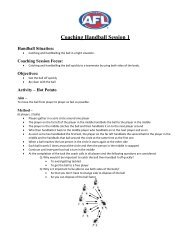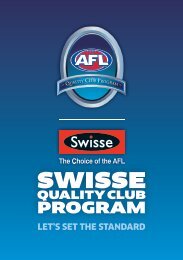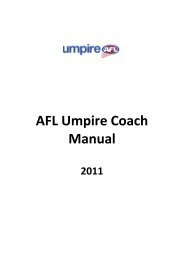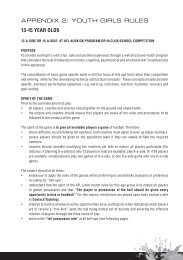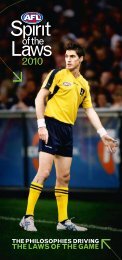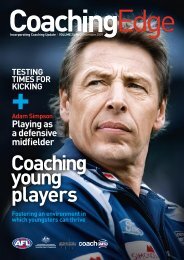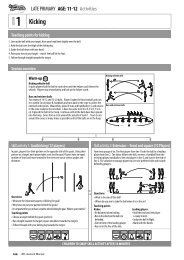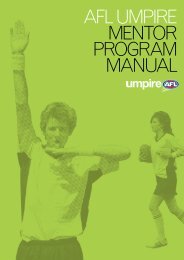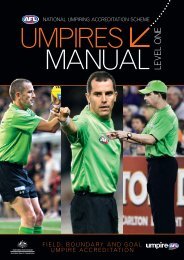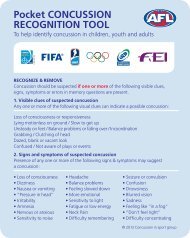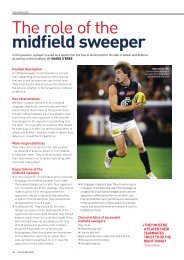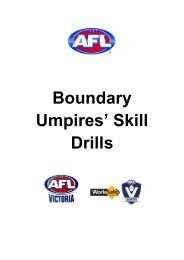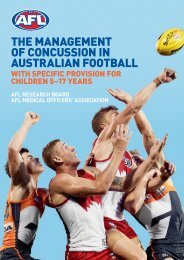2012 Youth Coaching Manual - AFL Community
2012 Youth Coaching Manual - AFL Community
2012 Youth Coaching Manual - AFL Community
You also want an ePaper? Increase the reach of your titles
YUMPU automatically turns print PDFs into web optimized ePapers that Google loves.
Environmental Conditions<br />
In managing risk, consideration must be given to environmental factors and their impact on participants. Sometimes extreme<br />
weather conditions (e.g. heat, cold, rain or wind) make it best to postpone training or competition. Different regions of<br />
Australia vary in the weather conditions considered extreme, due to their residents’ acclimatisation to the local environment.<br />
When scheduling matches, leagues and schools must always consider the player’s health, giving careful consideration to the<br />
following environmental conditions.<br />
Heat<br />
Vigorous exercise in sport places some people at risk of heat illness. Even in cool weather, heat illness may occur in people<br />
exercising at high intensity for more than 45 minutes.<br />
The risk of heat illness is obviously greater in hot and humid weather because:<br />
• during high-intensity exercise in hot weather people may not be able to produce<br />
enough perspiration to adequately cool themselves; and<br />
• high humidity may prevent adequate evaporation of sweat.<br />
Heat illness<br />
It is important that players and coaches are aware and react quickly to the following symptoms of heat injury.<br />
• Fatigue.<br />
• Nausea.<br />
• Headache.<br />
• Confusion.<br />
• Light headedness.<br />
Beat-the-heat emergency plan<br />
• Lie the player down.<br />
• Loosen and remove excessive clothing – cool by fanning.<br />
• Give cool water to drink if conscious.<br />
• Apply wrapped ice packs to groins and armpits.<br />
• SEEK MEDICAL ASSISTANCE.<br />
In high temperatures and humid conditions, leagues and schools should consider postponing scheduled matches to a cooler<br />
part of the day or cancelling them. It is recommended youth football providers follow the Sports Medicine Australia guidelines<br />
available on their website sma.org.au.<br />
Fluid balance<br />
Substantial amounts of water are lost through perspiration when exercising vigorously in the heat, so fluid balance is<br />
important at any time but needs more attention in some weather conditions. Participants do not instinctively drink enough<br />
to replace fluid lost during activity. They must be reminded to drink before, during and after training and competition.<br />
• Water is the most appropriate drink for re-hydration. However, diluted cordial or sports drinks may be supplied.<br />
Flavoured drinks may be more palatable to children who have consistently poor drinking habits during exercise.<br />
• Players should be encouraged to have their own drink bottles. This ensures that each player has access to an adequate<br />
level of replacement fluids and reduces the risk of contamination and passing on of viruses.<br />
• Where cups and a large container are supplied, cups should not be dipped into the container. Used cups should<br />
be washed or disposed of after use.<br />
• Cups should not be shared.<br />
Sun protection<br />
Leagues and clubs have a responsibility to protect participants, to the greatest extent practical, from the dangers of sun exposure.<br />
Participants should be encouraged to protect themselves against sun exposure by applying a 30+ sunscreen.<br />
Leagues and clubs should also maximise the provision of shaded areas at venues and events, and/or erect artificial shade.<br />
Sports Medicine Australia has developed a policy related to preventing heat illness in sport. These general safety guidelines,<br />
which are specific to geographical locations, are available on the SMA website at sma.org.au.<br />
108 <strong>AFL</strong> <strong>Youth</strong> <strong>Coaching</strong> <strong>Manual</strong>



